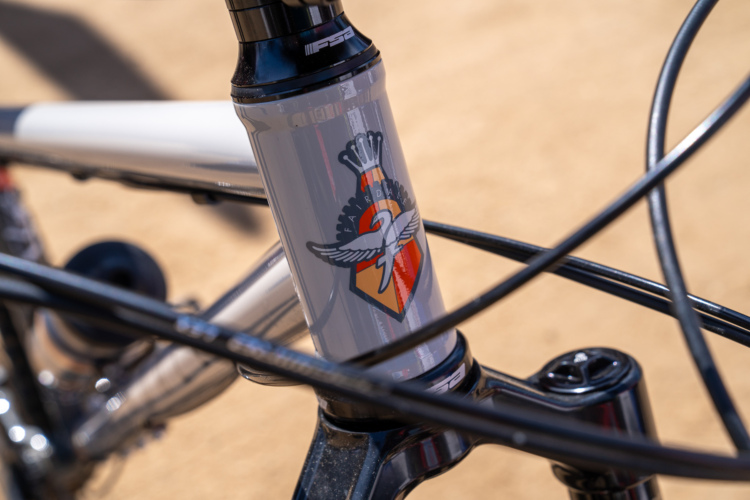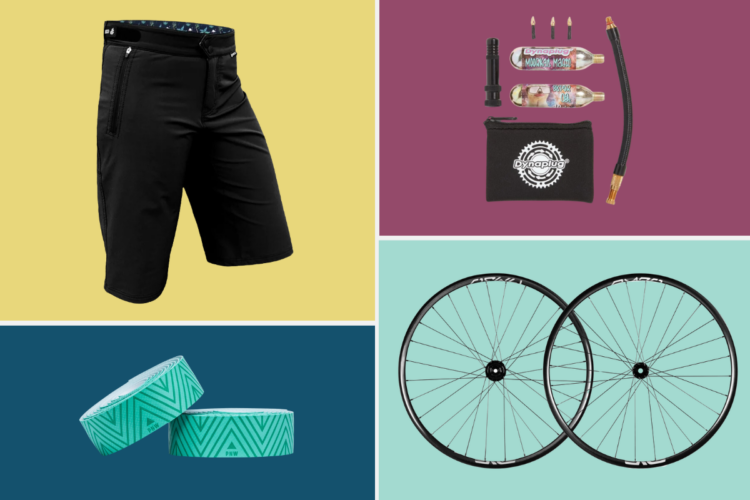I got a chance to demo a few women’s bikes at Interbike and I was impressed with the selection of high-performance cross-country mountain bikes available. Actually, let me correct myself, many manufacturers these days don’t necessarily make womens specific bikes, just smaller frames. With smaller frames, naturally, a more compact geometry follows (for males and females alike) and since front and rear shocks can be adjusted based on rider weight, there’s no need for women’s specific suspension. Two such mountain bikes that I found are a good fit for smaller riders are the Ellsworth Truth and Yeti AS-R.
The Ellsworth Truth in size X-small was a good fit for me (I’m only 5’0″), with the exception of the 175mm crankset, which made me lean down into my pedal stroke more. I certainly hope the build kit has a 165mm crankset for the X-small frames. All Ellsworth full suspension mountain bikes use their patented Instant Center Tracking (ICT) suspension technology, supposedly the most energy-efficient suspension design in the world. With the ICT, I felt totally comfortable and confident gliding over the rocky terrain at Bootleg Canyon on the Truth.

Another bonus from Ellsworth is their Project Pink. For three years now, Ellsworth has offered their bikes in a very special rose petal anodized pink frame finish. For every one of these Project Pink bikes purchased they donate $50 towards breast cancer research. You definitely won’t go unnoticed on this pink beauty and you’ll be supporting a great cause!
I used to be embarrassed about riding such a little bike, people often mistook my beloved ride for a kid’s bike (I guess the handlebar streamers didn’t help). Imagine what I thought when the guys at Yeti said, we make an Extra EXTRA Small frame that might work for me. Phew, those are 26″ mountain bike tires, I thought to myself when he brought the XX-small Yeti AS-R out. Another thing I noticed were the assymetrical chainstays on the AS-R, designed to provide better chain clearance while maintaining strength on the non-drive side of the bike. Built up with full XTR, I was ready to see what this bike was made of.
I originally thought the XX-small would be too small, but it handled perfectly. I was ripping through turns and descents. After just a few minutes, I felt as if the bike responded to what I was thinking. Even though the Yeti AS-R has a small 14.5″ frame, it doesn’t fall into the cute bike category, this is a serious racing machine and I didn’t even get to try the carbon version!

I rode a couple women’s specific mountain bikes from Specialized, too. First, the Specialized Safire FSR Comp proved to be a lightweight and race-ready mountain bike. The women’s specific geometry is evident in the Safire with the sloping top tube. The Safire is a fast mountain bike that can take a beating. Priced more than 3x the Safire FSR Comp is the women’s specific S-Works Era FSR Carbon. The S-Works Era is in a league of its own, weighing only 20 lbs for the complete bike, this bike is built for the pro mountain bike racers. I can’t think of anything negative about this bike, considering it practically pedaled itself up hills and took me for a fast, smooth ride.
Both the Safire and S-Works Era use Specialized proprietary front fork and rear shock. I didn’t want to like it, but the Specialized Future Shock e100 on the S-Works Era was surprisingly well tuned. Specialized also makes the handlebars, crankset, tires and saddles for their bikes. I’m sure the technology on the Specialized componentry, shocks specifically, will get even better over time, but that makes me wonder about the fate of the Fox’s and Rock Shox’s of the world.

Every mountain bike I tested had something unique and special about them. It’s hard not to want one of each! If you’re looking to upgrade to your next XC mountain bike, fit is unarguably the most important consideration. And if you’re a smaller rider like me, you’ll be overwhelmed with how many options there are now compared to just a couple years ago. Good luck and enjoy the rides!
















